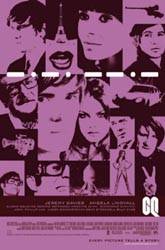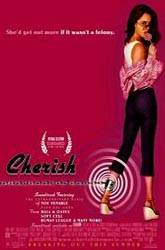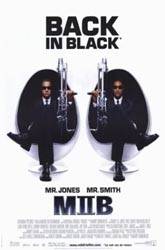 Director: Starring:
OTHER REVIEWS: Hollywood
Ending Jules
and Jim State
and Main The
Virgin Suicides |
CQ BY: DAVID PERRY Sofia Coppola's The Virgin Suicides, which made its international bow two years ago and still has not been forgotten by those of us who consider it to be among the finest debuts in recent years, came as the first film from the Francis Ford and Eleanor Coppola progeny. Her brother, Roman, has spent many years working on music videos (most notably The Presidents of the United States' "Lump" and recently The Strokes' "Last Night") but waited until now to make his move into his father's shoes. Though not quite the achievement of his sister (or for that matter, his father; though I doubt he had any aspiration of approaching that territory), his debut film CQ has the dizzying satisfaction of a Hollywood wunderkind, intimately showing a love for the movies that have most influenced him. Many have already noted that CQ is like an early project for a film school student, jealously striking against Coppola for never going to such a school and instead relying on his father's laurels (admittedly, much of the talented cast and crew come from Francis Ford's earlier works, a connection that would be lost on a young NYU graduate). But in the process of making these tinged efforts to lessen Roman Coppola's achievement, they miss what is unquestionably a movie that relates the love for filmmaking that these critics hold. In some ways, it feels like the ruminations of people angry that someone has done what they have long desired to do. More interestingly, though, Coppola is able to imbue the film with paternal subtexts not seen in most films. In some ways, the director is playing a Jesus' son, and, rightly, uses this for a theme within his own work. At one point, he has his protagonist Paul Ballard (Davies) speak with his seemingly successful father (Stockwell) at a short exchange in an airport lobby. Father Ballard speaks dizzily, throwing out musings that only further beguile a son intent on understanding something -- anything! -- in his life. The fact that he is a Coppola may have helped the director get a good cast and crew as well as financial backing, but it leaves him with pressures that cannot be easily fixed by a solemn tête-à-tête with father Francis. In fact, the movie has an endearing quality akin to Wonder Boys. Through a slight reversal, both are about characters seeing themselves through the achievements (or lack thereof) of their younger/older equivalents. At one point in the film, two struggling auteurs try to relate their own intentions: the older realist crony Andrzej (Depardieu) trying to make a statement and the younger Nouvelle Vague Turk Paul trying to make a film that tells about him personally. It's like watching an exchange between Roger Vadim and Jean Eustache in the closing moments of the French New Wave as the initial precursors (Renoir, Tati) were retiring and the early leaders (Truffaut, Godard) were closing down the 1968 Cannes Film Festival in protest. The movie that causes this disagreement between two equally talented directors is a 1960s pop-kitsch spy film called Dragonfly (have no fear, it has nothing to do with the recent Kevin Costner clunker of the same name). Set in 2001, it follows a posh super-spy/femme fatale (played in the film by model-turned-actress Lindvall's activist-turned-actress Valentine) as she runs across the dark side of the moon trying to stop a revolutionary leader called Mr. E (Zane), who is part Castro, part Guevara, and part pin-up beefcake. Woody Allen previously made fun of this character in Sleeper, but Coppola and a perfectly stilted Zane turn it into one of the most recognizable meta-filmic characters in recent years. Dragonfly was originally directed by Andrzej, but he was thrown off when his pro- revolutionary message for a finale is deemed anticlimactic by the Dino De Laurentiis-like producer Enzo di Martini (Giannini). In hopes of getting someone that might find an exciting way to end the film without costing much more money, di Martini and his associate Fabrizio (Ghini) call on the talent of the loud directorial flavor of the moment, Felix de Marco (Schwartzman), a Blow-up size artist with an ego larger than his paycheck. But when his love for fast cars and faster women lead to a collision and a broken leg, de Marco drops out, leaving the film's editor, Paul, as the only person left who really knows the material. As the rest of the world celebrates the new decade (the film covers late 1969 and early 1970), Paul is left struggling to find an ending for the film. More problems arise: his work on this big, garish film is meant as something to tide him over as he works on a David Holzman's Diary-style film on "pieces of my life, my life in pieces." As his mind moves towards these two films and the attraction that he has for Valentine, Paul's French girlfriend Marlene (Bouchez; the sprite miracle from Erick Zonka's The Dreamlife of Angels) begins to feel unappreciated and threatens to leave unless he sets his priorities straight. Nearly every character in Coppola's screenplay is an exaggerated caricature of some late 1960s role, leaving most of the actors showing of a great deal of enjoyment in their performances. Including the ever-solemn Davies, most of the cast comes from decades of watching roles perfected by others, ranging from Davies' Jules to Schwartman's Jim to Lindvall's Catherine. The movie may be set in Paris, but every facet of its style and substance comes from a land of celluloid. Regular Francis Ford Coppola's production designer Dean Tavoularis helps to give the movie its self-reflexive pleasures, turning every set into something lost from a late '60s kitsch film like Barbarella, Modesty Blaise, or Danger: Diabolik. Costume designer Judy Shrewsbury also does wonders, creating clothing for Valentine/Dragonfly that would have been just as suitable on Brigitte Bardot or Jane Fonda in a Vadim or Antonioni production. And all of this settles down on an excellent showing of
love that Coppola employs for the film. CQ is never as pretentious as it could
have been, mainly because Coppola himself never lets high aspirations rise above his love
for the material. He does struggle with the juggling of the film's multi-themed,
multi-storied structure, but that somehow gives CQ a certain feeling of
amiability. It is not a movie built around the static information given in a few film
school classes, but comes from the heart of someone just trying to get out all the
cinematic emotional baggage Coppola has. He's not directing a movie to make his dad proud,
but instead to fulfill his own need to relate all the love for the old movies his father
probably happily played for young Roman as a child. Like the protagonists of Ted
Kotcheff's The Apprenticeship of Duddy Kravitz and Francis Ford Coppola's own You're
a Big Boy Now, it's safe to say that Roman Coppola is well on his way to succeeding in this journey. |




